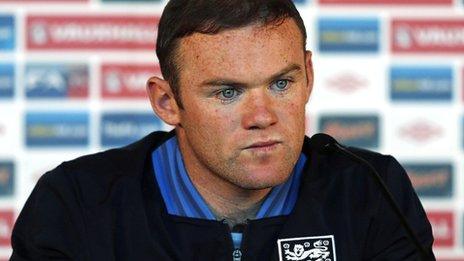Wayne Rooney: Has he fulfilled his potential?
- Published
- comments
At the time, the primary significance of Everton's winning goal against Arsenal on 19 October 2002 seemed to be the end of the Gunners' 30-match unbeaten run.
Of course, the fact that Wayne Rooney had just become the youngest goalscorer in Premier League history, external was more than noteworthy - but it needed the comments of Arsene Wenger to put the 16-year-old's 25-yard curling strike into context.
"Rooney is the biggest England talent I have seen since I arrived in this country," said the Arsenal boss., external
"We were beaten by a special goal by a very special talent."
Just over five months later, the boy in a man's body became the youngest player to represent England, a record since taken by Theo Walcott.
"David Moyes was not sure he should be in the national team so early," then England manager Sven-Goran Eriksson told BBC Sport. "But he did it, played well and the rest we know."
"The rest" that the Swede refers to began at the 2004 European Championship, where four goals made Rooney - blessed with a footballing brain advanced way beyond his years - the second top goalscorer and led Eriksson to compare him to Pele.
But the tournament and its immediate aftermath would come to represent a fork in the road in Rooney's career.
On the one hand, a move to Manchester United put him on the path towards trophies that would have been out of reach had he have remained at Everton.
But on the other, he has struggled to make a similar impact for England ever since, particularly in major finals.
Eight years on from Euro 2004, Rooney has won four Premier Leagues, two League Cups and the Champions League.
With 181 strikes in 371 appearances for the Red Devils, three of which have been named goal of the season, it would be hard to argue Rooney has not provided a return on United's £27m investment., external
For his country, though, only one goal has come in the three major tournaments England have played in since Euro 2004.
Rooney's goals at Euro 2004
Despite that, his total of 32 goals puts him fifth on England's all-time list, but Rooney acknowledged the disappointment at his achievements for the Three Lions before last week's win over San Marino, saying: "I haven't been at my best for England, that is something I'm desperate to put right."
There are mitigating circumstances that should be taken into account when evaluating Rooney's record at the highest level, though.
He carried injuries into both the 2006 and 2010 World Cups and was suspended for the opening two games of Euro 2012, although that was because of his own petulance in the final qualifier against Montenegro.
But former England defender Danny Mills suggests his problem lies deeper than that, with Rooney's standout qualities often making him the only hope of an England team short of world-class talent.
"We've pinned all our hopes on Wayne since he was 18 years old," said Mills, who was playing when Rooney made his international debut against Australia in 2003.
"The moment he's not in the England team you think 'that's it, we're not going to win'. Having all that pressure on your shoulders is difficult, no matter who you are.
"At Manchester United he's had great players around him and that helps, but at international level you can't be a one-man team.
"That doesn't happen with the likes of Germany, Spain or Brazil. It helps when you've got 10 other stars around to share the burden."
It is a problem that Rooney shares with the world's two finest players, Lionel Messi of Argentina and Cristiano Ronaldo of Portugal. For all the glory they have earned in club football, in the international arena the trio have one Olympic gold medal between them - won by Messi in 2008.
Currently, that is perhaps the only comparison that can be drawn between Rooney and the La Liga superstars, but former United team-mate Quinton Fortune believes the 26-year-old has the potential to be put in their bracket.
"He can push himself in the top three with Messi and Ronaldo," said the South African. "He's fulfilling his potential and I still think he has got more - I know what he is capable of doing."
But for Mills, Rooney's legacy may hinge on his international performances, particularly as Sir Alex Ferguson's team will always be loathed by a large portion of England supporters.
"The fact that he plays for United and is successful will go against him in some people's eyes," he said. "Until England win something people will always have their opinions."
Therein, perhaps, lies the rub. For some, including the man himself, the fact that Rooney is on course to become both England's most capped player and highest goalscorer may not be enough.
It is stopping the clock that has been running since the summer of 1966 that really matters, an ask that is surely too big for one man alone.
Anticipating the demands that would be placed on Rooney, Eriksson famously warned fans and media: "Don't kill him", external when he quit as England boss in 2006.
Now, he reiterates the former Everton man's importance to the Three Lions. "He is a fantastic footballer, he has everything. He ranks very, very high, one of the best," said the Swede.
"He's still young, he can still get better and he will keep that standard for the next five, six, seven years."
And, for Rooney, that is the beauty of having achieved so much by the age of 26. He still has another career's worth of football ahead of him.
Additional reporting by Simon Austin and Jonathan Jurejko
- Published15 October 2012
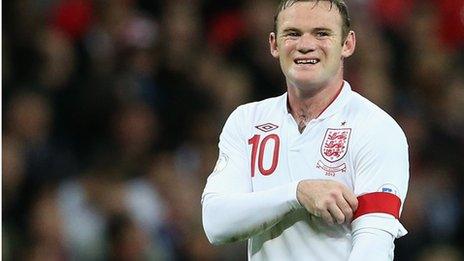
- Published15 October 2012
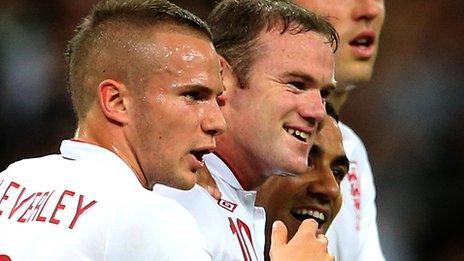
- Published12 October 2012
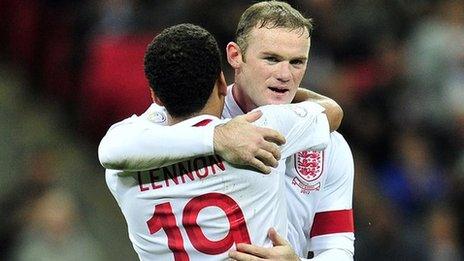
- Published11 October 2012
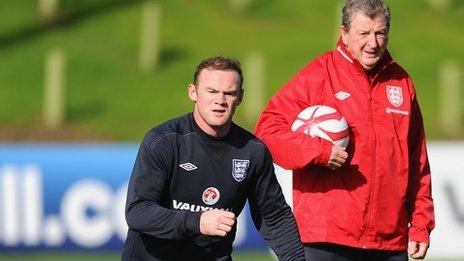
- Published11 October 2012
